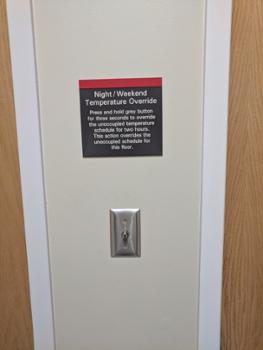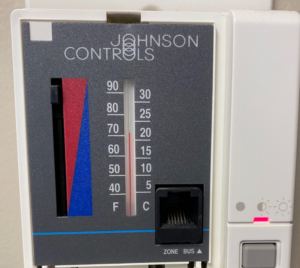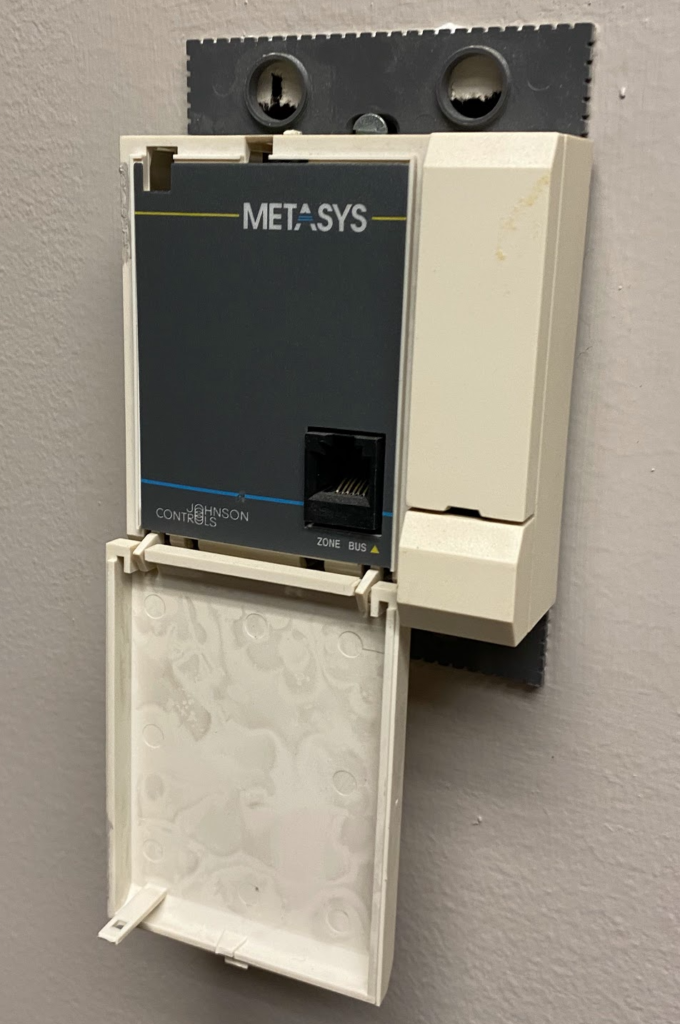HVAC
Working After-Hours in MRC

The building heat/AC is reduced outside of business hours, on weekends, and on holidays. The only exception is the labs. Their temperature is maintained 24/7.
The 3rd (by 322D MRC) and 4th (by 443 MRC) floors have temperature override buttons located roughly in the center of the building, on the west side of the building. Attached is a picture to show you what they look like. If you are working during off hours, you can press the button and the heat/AC for that section of the building will be temporarily reset to the business hours setting. I believe the temperature setting is overridden for two hours.
Thermostats


Folks in ECE will recognize these thermostats as the standard thermostats in most of the offices. We wanted to share a few facts about them:
- In EB2, every other office has a thermostat — if you don’t have one, then you’re sharing the one in the office next to you. When you neighbor adjusts his, you’re affected as well.
- Moving the lever to the top doesn’t indicate that you want it to be 90 degrees, nor does moving it to the bottom set you under 40 degrees. The buildings have set general temperatures — NC State’s Sustainability Standard Operating Procedures state that temperatures for occupied space should range from 68°F to 71°F for heating. The thermostats are just allowing you to adjust about a degree and a half up or down within that range. I will also note that if you use a space heater in one office, you can confuse the thermostat, causing the system to not heat both rooms — and your neighbor will end up with a very cold office.
In MRC, every office should have one of these thermostats. You will quickly notice that there’s no controls on it. The building HVAC system doesn’t allow the end users to make even minor adjustments to office temperatures.
Use of Space Heaters
NC State believes that space heater use should be a last resort following Facilities personnel attempts to correct heating requirements in a campus facility’s heating system. Facility heating system modifications should be made where possible to avoid the use of space heaters. Portable space heaters are not intended for use as permanent heating appliances.
The following are the highlights of the campus guidelines for Space Heaters — the complete document can be found here (and includes the Appendix B form noted below). The first step before thinking about a Space Heater is to report that your office is too cold to ecehelp@ncsu.edu so we can try to have Facilities fix this — this also helps to document the problem.
You MAY NOT bring in a space heater without pre-approval.
When it is impossible to maintain a suitable working environment (68°F-76ºF), as documented by the HVAC personnel or other qualified person, a space heater can be utilized based on the requirements of this program. The employee seeking to use a space heater must initiate the space heater permit form (See Appendix B) and abide by the following guidelines.
For medical conditions requiring supplemental space heating in an otherwise suitable working environment (68°F-76ºF), proper medical documentation (See Appendix B) from a Licensed Practicing Physician and recommendation for supplemental heat is required prior to approval of space heater use.
If approved…
- The space heater must contain fully enclosed heating surfaces, be provided with a thermostat, tip over safety shut off, and be listed by an approved listing agency such as Underwriter Laboratories or other accredited listing agent.
- The user must ensure the space heater is not plugged into an extension cord, multi-outlet strip, or surge protector. The space heater must plug directly into an approved 120 volt AC receptacle. Space heaters and their cords shall not be positioned so as to create a tripping hazard in the work area.
- The employee will ensure that the space heater is turned off when unattended and at the close of business.
- A minimum three feet area around, in front of, and above the space heater or an area greater as recommended by the manufacturer will be maintained around the space heater as clearance from combustibles.
- Space heaters shall not be used under desk or other furniture or equipment unless the aforementioned space requirements shall be met.
- Portable electric space heaters shall not have worn or damaged electrical cords, and the plugs shall be in good condition.
Holiday Energy Savings Initiative (HESI)
Every year, campus shuts down heating in our buildings over the winter break and where they can, including around the long Thanksgiving weekend.
After Thanksgiving, the setbacks usually begin the second week of December and end the second week of January. Let me point out that when we get back on the first week of January, only the classrooms and teaching labs are still be impacted — heat should be back for Administrative and Research areas.
Some basic points:
- NC State’s Sustainability Standard Operating Procedures state that temperatures for occupied space should range from 68°F to 71°F for heating. While unoccupied, building temperature setbacks range from 55°F to 60°F for heating.
- A setback does not mean that the HVAC system is turned off completely. The HVAC system will continue to operate to maintain the relaxed setpoints.
- There will be no impact on electricity.
Details on the program can be found at: https://go.ncsu.edu/hesi
This process has been in place for years because it saves campus a lot of money. I note this, because while there is an exemption process each year (announced in late November usually), requests may be denied. When submitting requests, we recommend that the PIs fill out the form.
